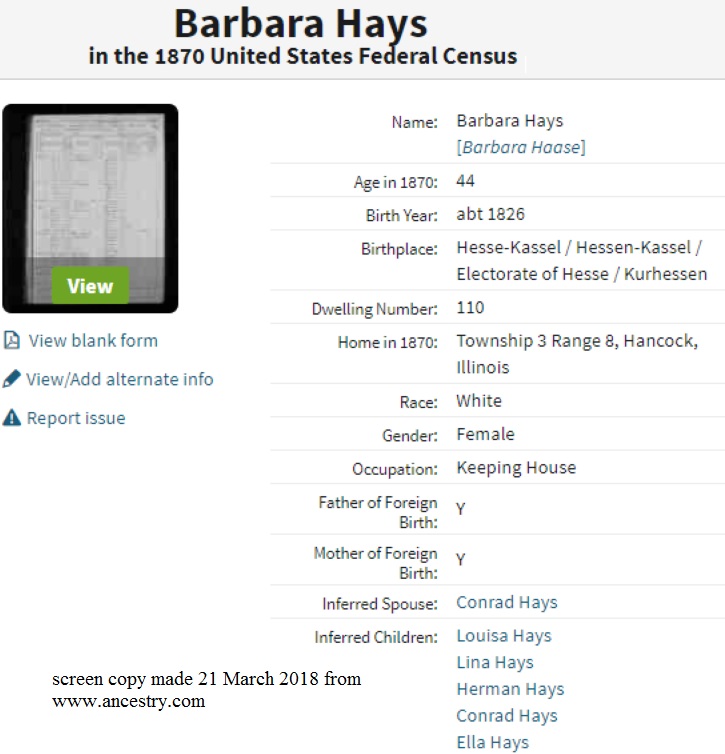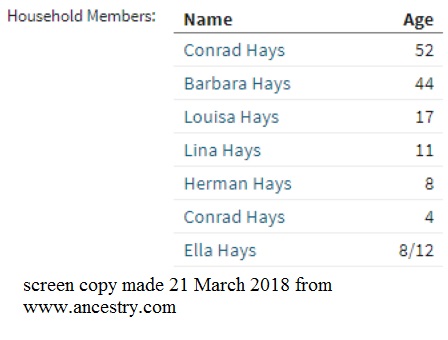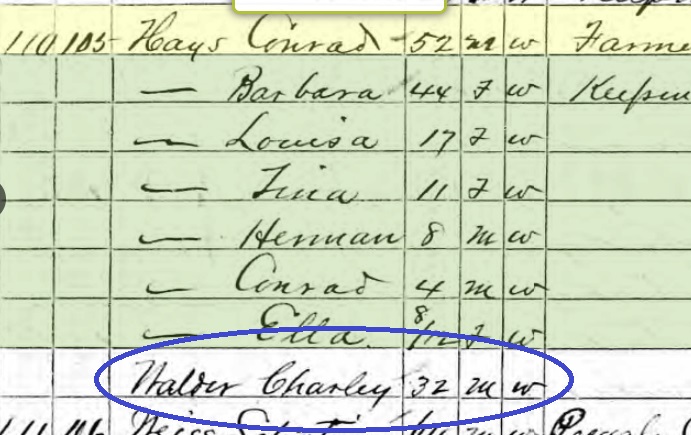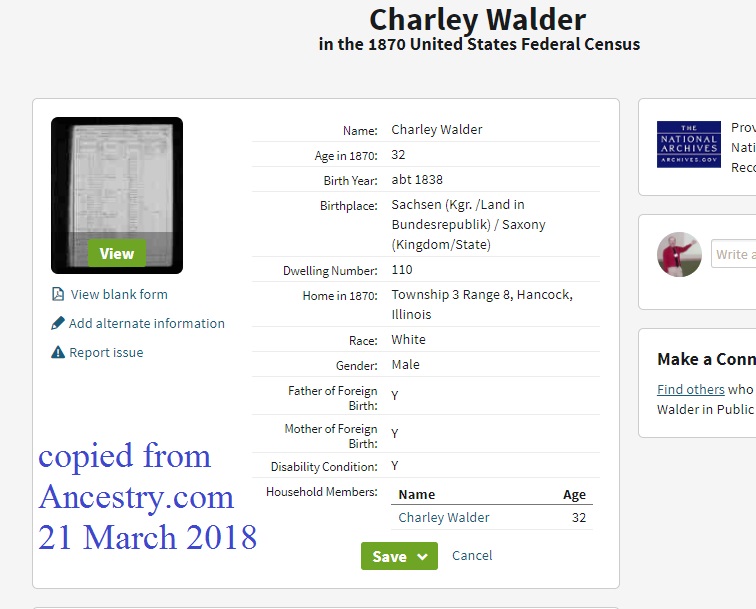Pre-1880 US census records can allow genealogists to gather clues about family relationships. But at their very essence they confirm that individuals are living in the same household at the point in time when the census enumeration was made.
Ancestry.com’s 1870 census database now infers family relationships from the census enumeration. These two screen shots show that information for Barbara Hays (actually Haase) who is enumerated in Hancock County, Illinois, in 1870.

The inferred spouse is correct and the inferred children are correct are correct in this case. That’s not always the situation for a variety of reasons. The problem in this specific family is that Ancestry.com infers that the children are all Conrad’s children as well–they are not.
Louisa is Barbara’s daughter by a previous marriage and she was enumerated with the last name of her step-father in 1870.
Ancestry.com also indicates that there are seven members of the Hays household.

That’s not quite right either.
There is a thirty-two year old native of Saxony, Charley Walder, living in the household as well. At this point, his relationship to the family is not known.
But he is living in the household and the “household members” list in the “record” from Ancestry.com should indicate that.

The 1870 Census database at Ancestry.com indicates that Charley is in a household by himself.

It does show dwelling number 110, so that’s entered correctly.
But Ancestry.com’s automated “household system” should not separate these individuals out.
Those of us who always look at the original (which you should do) would easily see exactly who was in the household.
But this is one of those “automate” the research process “helps” that doesn’t.
Kat says:
Ancestry’s indexing leaves much to be desired. Your post is a reminder to never assume relationships from the index alone.
Denise Ross says:
The way Ancestry.com defines “inferred” does not appear to be exactly clear. So please tell me if I am wrong. If the person is inferred it is because their name may be wrong by spelling? The internet shows “inferred” like a women who is living in a house; however, the head of household does not see himself as married? Please help me understand this.
Thanks,
mjnrootdig says:
It appears that Ancestry.com infers household members have the same last name–at least that’s what has happened in the ones I have seen. The 1870 census does not indicate marital status. If you have an entry from 1870 that Ancestry.com has inferred in an odd way, please let me know and we’ll discuss it or post about it.
Thanks.
Michael
Krystal J says:
i have a 1870 census with inferred spouse on it
Eve says:
I think inferred means there were children before marriage, especially for people of color. Slaves were not permitted to get married but was labeled cohabitation. In my instance, my great-great grandfather shows an inferred spouse with children in 1870, perhaps slaves. In 1880, it shows him married to my great grandmother, but also show them as being free. It does not show the first woman as married but they have children together. That’s what I think and it makes sense in my case. Why Ancestry could not grasp this is indeed a mystery.
Keisha says:
I’ve noticed that Ancestry.com use of the word inferred children leaves questioning about the census reviewed. The 1870 census does not indicate the marital status. Would this imply as the head of household being widowed or just not claiming to be married or is there a missing child of the head of household who was married to the inferred child?
Thanks,
Keisha
mjnrootdig says:
I would not put much credence in Ancestry.com’s use of “inferred” children. It’s programmed into their system and generalizes. Generally speaking if a household “appears” to be husband/wife and children, then one can use that premise to search other records. But it is always possible that it’s man/sister and his children or man/secondwife and a combination of his/hers/ours.
Chiquita White Parker says:
On my 1870 census my great great great grandfather your right it doesn’t indicate about marriages it doesn’t even have a woman name on the census. And at the bottom it has INFERRED CHILDREN & it’s about 5 but he did have 2 children of his own and there by his wife Emeline Williams. So altogether it’s 7 children in the household so am guessing that she had kids before they were married and they all took His last name because they were in the household.
Krystal J says:
i have a 1870 census with inferred spouse on it
pj1 says:
My great grandfather was born in 1869. In 1870 he is listed in the household of the man we presumed to be his father. Father’s last name is Glodo. GGpa is listed as Albert Aiken. Im left wondering of Mr Glodo is my GGGpa.
mjnrootdig says:
Possibly a step-father?
Kitty Giffin says:
You have a typo on this page. It should say, “At their very essence…” not “there”.
mjnrootdig says:
Oh goodness. Thank you for letting me know. I will fix that.
Kimberly says:
Ms. came into use in the 1950s as a title before a woman’s surname when her marital status was unknown or irrelevant. In the early 1970s, the use of Ms. was adopted …
Judy says:
I’m confused, does inferred children mean they are not one of the parents real children?
mjnrootdig says:
It means that the census doesn’t specifically state they are children.
M says:
My GG grandmother was the only child out of several children that had inferred next to her name only.What could that mean?…..she was supposed to be Native American but I can’t find other records to verify it…..
mjnrootdig says:
Don’t use the “inferred” on Ancestry.com’s transcription. Refer to the actual image of the census. The “inference” is an automatic process and sometimes is not worth all that much.
Shatara Thomas says:
How did you find out that she was Native or was a part of the native because back then they used mulatto as a race meaning mixed race or Native. Inferred means the parent or parents to that child. Most cases it’s the parents unless the slaves owner rapped the woman and disowned the child for the woman boyfriend/husband to raise his own.
Dee says:
I believe this because this is what happened to my great grandfather
Me says:
that’s what I was thinking in my same kind of case too…….
David E Griffith says:
Just stumbled on this today. My 3g grandfather married for a second time in 1862. The 1870 US census lists his new wife as inferred daughter! Seems to me they should just forget about adding labels that are “guesstimates.”
Erin says:
I came across an 1870 census in which the parents are listed as inferred with 7 children named in the household. Could that possibly mean that one or none are the parents of the children?
mjnrootdig says:
There is no relationship stated to head of household in the 1870 census–that is why Ancestry.com refers to the oldest male and oldest female in the household as the inferred parents–there’s no guarantee that they are both the parents of all children as there could have been previous marriages of either of them or non-biological children living in the household.
Geraldine Moss says:
If it is known, where the parents were born, the names of the parents should be in the records, rather than saying the person’s father and mother was born in such and such state. I have been searching for my great – grand mother’s father and mother, and no luck. Does anyone know another way.
Dee says:
You can check the town and state where you think she might have been born in their census data or court records
Rabbit758 says:
Check all southern states, including Virginia, SC, and even Canada being that they were sold, traded, moved to other slave owners farms for various reasons. Now don’t forget that a ton of slaves were sent by the ship loads to Brazil, South America. There they have most of the buildings and artifacts still present. Everyone should visit Brazil
Zena Hunt says:
How do I you find out the name of the slaves listed on censuses? Is there a form to check?
Anne Marie Roy says:
I know from looking at a census of my grandparents, I noted a person listed with their family. I checked with my Aunt, whom stated it was a person they rented a room out to. During financial hard times that is what her parents. So that might be another fact not interpreted by Ancestry.
Rick Foster says:
Inferred could also be as in the past the parent or spouse could have passed and was raised by a related family member or a new relationship. Back in the day it was easy to assume raising of families as your own and giving them the last name.. Now it takes lengthy court case.
mjnrootdig says:
That’s true, but the real reason relationships are inferred in the 1870 census is that no relationships are stated in the census record. Any relationship would have to be inferred.
Me says:
that’s what I was thinking in my same kind of case too…….my gr gr grandma is supposed to be NA
Ashley says:
I found a 1870 census and it has an inferred child on it then on the next census (1880)I find the inferred child isn’t listed also the father that’s listed on the 1870 census is peter Grubb but on the other census his name is Alexander Grubb are is this the same person
tonya holmes says:
I was checking for info on my great-grandfather. in the 1870 census they have him listed with a father who is white and him and his sister as black at age 16 abd 13, Earlier at age 6 they have a BM listed as inferred father.
Jacqueline t says:
Can inferred parents be sealed to the children? My great grandmothers parents are listed as inferred.
Alice English says:
In checking for my Great grandfather, I found my possible Great Great Grandfather. However, there is a difference in the way the name is spelled… from Bartley to Bradley. The location/area is basically the same. I have been told that names or just incorrect name spelling is quite common. Comments please.
mjnrootdig says:
They do sound vaguely alike. I’m assuming that the other details about this person and their family matches. A one-off spelling error is fairly common, especially during this time period. The important thing is that the other details are consistent with other census enumerations and what is known about the person.